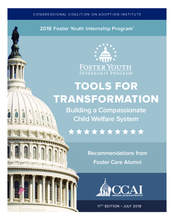Displaying 141 - 150 of 350
This cross-sectional study uses a random sample of forty-six foster care alumni from a Midwestern public university to explore the relationship between exposure to trauma and post-secondary academic achievement.
Findings from this study suggest that waivers may be a viable strategy for promoting higher education among foster youth.
This article analyzes secondary data collected from one of the most comprehensive longitudinal studies of foster youth.
The current study examined if the methods used to define and describe maltreatment contribute to the association between maltreatment and academic functioning in youth.
The objective of this study was to determine if a school support intervention for adolescent orphans in Kenya had effects on mental health, a secondary outcome.
This study examined educational attainment and earnings among former foster youth in early adulthood.
CCAI’s Foster Youth Internship Program® is a highly esteemed congressional internship for young adults who spent their formative years in the U.S. foster care system. In this annual policy report, the interns focus on subjects they are personally passionate about due to their experiences and understanding after living in foster care and make personal recommendations for improving the U.S. foster care system.
The aim of the article is to describe and discuss how issues related to schooling and educational achievement are recognized and addressed in social services case files for children and young people placed in out-of-home care (OHC) in the city of Gothenburg, Sweden.
This case study follows a foster teen's matriculation through high school and the challenges she faces while trying to achieve her dream of going to college.
This study adds to the literature by comparing the association between children's exposure to placement in care and lack of secondary education (i.e. post-compulsory education after age 16) across three Nordic countries: Denmark, Finland, and Sweden.

